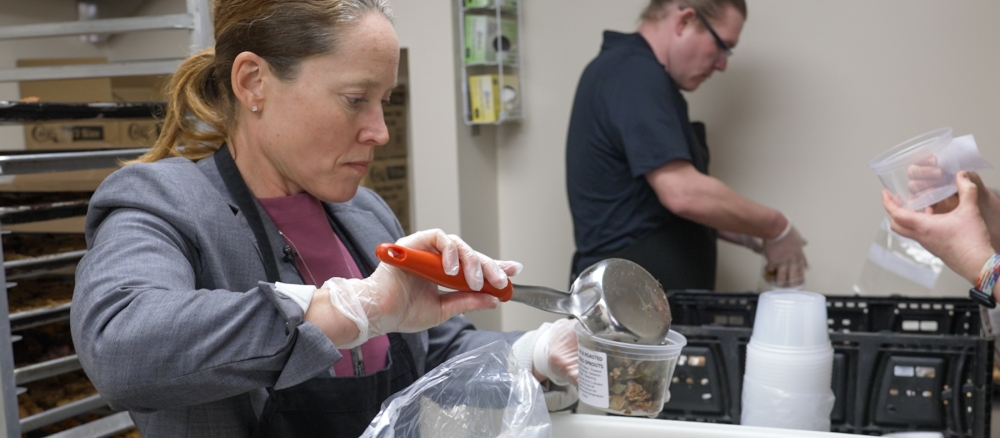It’s an afternoon in early April and MPCA Commissioner Katrina Kessler dollops a scoop of aromatic Brussels sprouts into a to-go container. The sprouts are being packaged up into a meal kit available for families and individuals who need food in the Mankato region.
Kessler and Climate Director Kate Knuth were visiting the South Central Minnesota Food Recovery center in Mankato to learn how this organization is keeping unused food out of landfills and feeding its community. This work highlights the types of initiatives that will be funded through the state’s $200 million Climate-Smart Food Systems program — a new push to reduce waste, fight hunger, and cut climate pollution.
The Climate Smart Food Systems initiative, funded by the U.S. Environmental Protection Agency’s Climate Pollution Reduction Grants program, positions Minnesota as a national model for transforming our food system from farm to freezer. Led by the MPCA in collaboration with other state agencies, local governments, and Tribal Nations, the climate-smart food systems project will distribute this investment through multiple programs administered by these organizations over the next five years.
South Central Minnesota Food Recovery and its restaurant partner, the Wooden Spoon, are already showing what success looks like. With support from two $75,000 MPCA grants in 2020 and 2022, the organization installed commercial refrigerators and freezers that allow it to safely store surplus food donated by restaurants, farmers, retailers, and the delivery drivers who serve them. That food is then processed into meals and redistributed to hungry families and individuals in the Mankato region.
In 2023 alone, the nonprofit recovered more than 53,000 pounds of edible food that would have otherwise gone to waste. This food rescue work doesn’t just nourish the community, it also prevents the release of harmful greenhouse gases. When discarded food decomposes in landfills, it produces methane, a greenhouse gas 25 times more potent than carbon dioxide. In fact, food waste in Minnesota creates as much climate pollution as 766,000 cars on the road each year.
With nearly half of all discarded food in Minnesota still edible, the potential for impact is enormous. Preventing food waste reduces greenhouse gases 20 times more effectively than composting — and rescues resources already spent on growing and transporting that food.
During the tour, Kessler and Knuth saw the refrigerators that South Central Minnesota Food Recovery purchased with the MPCA grant, heard stories from local leaders, and even portioned out foods that the nonprofit will distribute to the community.
“We know that pollution from landfills is a powerful source of greenhouse gas emissions in Minnesota,” said Kessler. “Being able to reduce waste and meet a local need for food all while reducing emissions is a win-win-win.”
The Climate Smart Food Systems program includes $10 million dedicated to clean refrigeration and $33 million committed to food waste prevention, composting, and food-to-livestock programs. The initiative takes a holistic approach to climate-smart solutions that also support local economies. These kinds of investments, state officials hope, will inspire programs like South Central Minnesota Food Recovery’s across Minnesota.
Visit the Climate Smart Food Systems web page to learn more about Minnesota’s initiative and sign up for updates as the MPCA and other state agencies roll out program investments in 2025.

